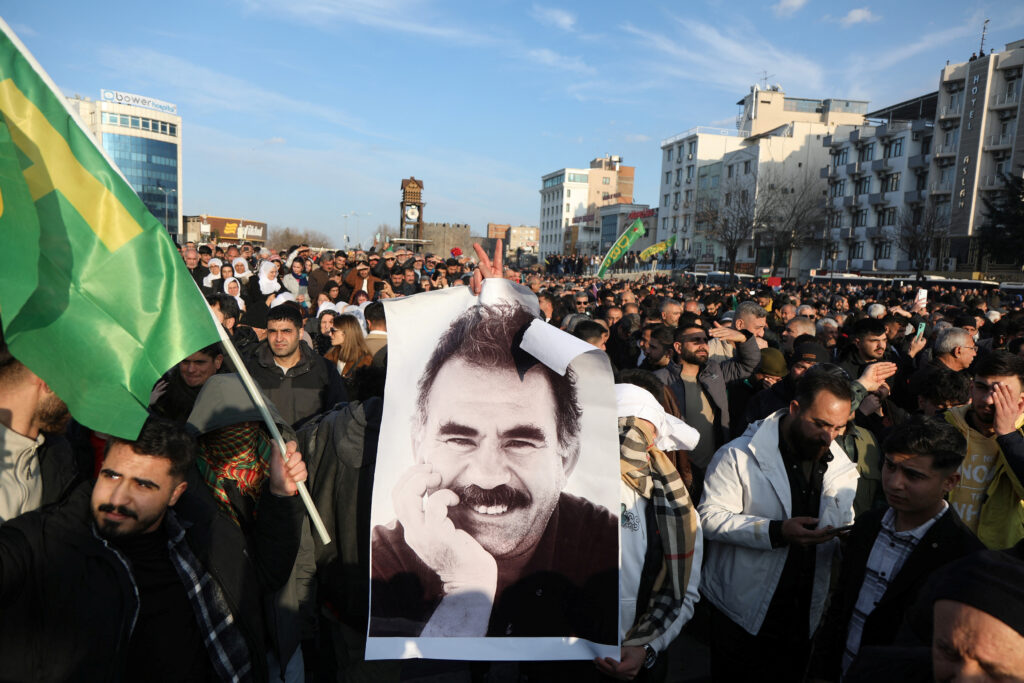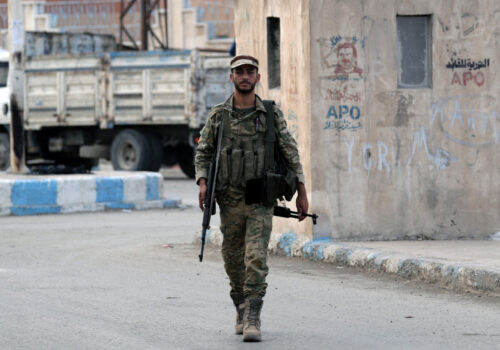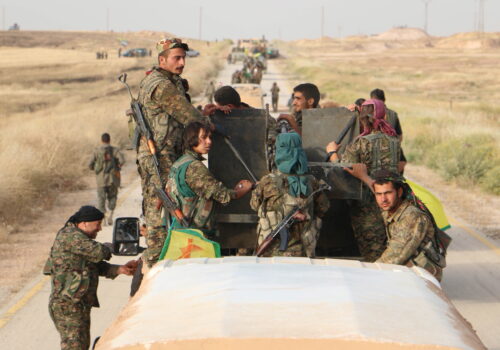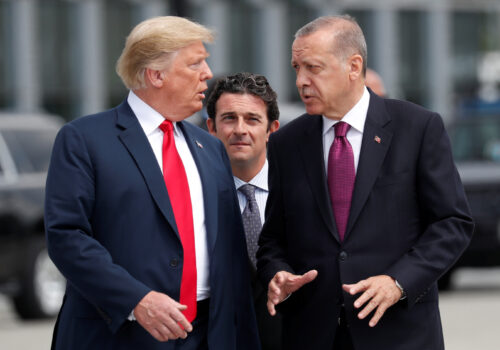A (possible) farewell to arms. On Thursday, Abdullah Öcalan, the imprisoned founder of the Kurdistan Workers’ Party (PKK), called on the group to disband and disarm. The militant group—designated as a terrorist organization by the United States and others—has fought the Turkish state for decades, and its affiliate groups are also active in Syria and Iraq. The stunning turn from Öcalan prompts all sorts of questions. So we turned to our experts for answers.
1. Who is Abdullah Öcalan, and why is his statement such a big deal?
Öcalan is the imprisoned symbolic leader and driving co-founder of the Partiya Karkeren Kurdistan (PKK), a US-designated Foreign Terrorist Organization rooted in radical leftist ideology and revolutionary violence. It has fought the Turkish state in Turkey since 1984 and spawned affiliates in Syria, Iraq, and Iran. Tensions stemming from the PKK conflict have roiled Turkey, the region, and US-Turkish relations for decades, and thwarted the search for stability, prosperity, and security for Turks, Kurds, and other peoples of the region. The statement marks the first serious attempt in over a decade to end the PKK’s armed campaign and normalize politics in Kurdish-majority areas affected by the conflict.
—Rich Outzen is a geopolitical consultant and nonresident senior fellow at the Atlantic Council Turkey Programs, with thirty-two years of government service both in uniform and as a civilian.
Since the PKK’s establishment in 1984, Turkey’s conflict with the group has resulted in at least forty thousand deaths. Some unofficial estimates put this number as high as one hundred thousand. And that’s just the human toll. It is hard to quantify the economic losses from a war that has lasted over forty years.
Öcalan is the founder of the PKK, and he has been imprisoned in Turkey since 1999. His call to end the PKK, even though he is still in jail, is a big deal. But Öcalan left the final decision to the PKK’s current leadership, and we still need to wait for the PKK party congress for the final word. The timeline of this congress is not yet known. If Öcalan’s call is ratified there and then is followed by all Kurdish militias in Syria, Iraq, and Iran, as well as in Europe, then this will be a big win for all parties.
—Defne Arslan is the senior director of the Atlantic Council’s Turkey Programs.
2. What are his possible motivations for making this statement?
If we can read between the lines of Öcalan’s statements today, he sounds like he has lost his hope to win against the Turkish military and is looking for a more official and political ground to continue their battle. He also called the PKK an outdated organization rooted in Marxist/Leninist ideals that do not exist anymore.
—Defne Arslan
Öcalan presumably wants to cement his legacy as something more than a militant or terror detainee and to be remembered as a peacemaker who translated violence, or “resistance,” into political gains. He has previously espoused partnership between Turks and Kurds and in his new statement embraced the Turkish Republic as the vehicle to do so—another step in a long evolution from anti-state, separatist dimensions of PKK ideology. He likely sees the writing on the wall regarding his movement’s Syrian branch (the People’s Protection Units, or YPG) given the new post-Assad reality, and he knows the time is now for political developments to remove the motive for new Turkish military operations to eradicate it.
—Rich Outzen
3. What does this mean for Turkish President Recep Tayyip Erdoğan’s agenda?
Erdoğan pursued a peace process with the PKK from 2011 to 2014, which was interrupted by events in Syria and domestic political struggles. He intends to be the Turkish leader who ended PKK terrorism while improving the conditions of Kurds in Turkey and the region. A resumed peace process will help Turkey’s economy and relations with the United States, and it will remove an obstacle to reintegration of Syria (and Iraq) into a Turkey-driven regional economy. Moreover, it may strengthen his hand in terms of domestic politics as he re-attracts liberal Turks and leftist Kurds who rejected his more hardline stance on the PKK over the past decade.
—Rich Outzen
If all PKK-linked Kurdish groups follow Öcalan’s call to disarm and dissolve, then this will be a big win for all sides, ending a conflict that has persisted for more than forty years. Such an outcome could also help Erdoğan receive the support of most of the Kurdish population for the amendment to the Turkish constitution he needs to stand for reelection.
—Defne Arslan
4. What can we expect next from PKK affiliates throughout Turkey and the wider region?
The PKK seems likely to heed Öcalan’s call for a congress of leadership and affiliates to act on his statement. I expect there will be caution and conditionality—a process of phased implementation rather than an immediate transformation. The Syrian affiliate is most exposed and probably will comply most readily. There may be dissident factions that refuse to disarm or stop fighting. (Think, for instance, of the “Real IRA,” the version of the Irish Republican Army that broke away from the IRA and Provisional IRA in 1997.) The aging cadres in the Qandil Mountains may be looking for an honorable way to come down off the mountain, and the organization is highly centralized in ideological terms despite its regional distribution. Within Turkey, the organization has in any case lost most of its capacity to sustain armed attacks, so the question there is political process, while across the border in Iraq and Syria, the question is compliance.
—Rich Outzen
5. What does this mean for US cooperation with PKK affiliates in Syria?
The United States has already developed plans to withdraw its forces from Syria, and I suspect indirectly has been advising its partner force that the best strategy moving forward is political reconciliation with Damascus and Ankara. Prudence dictates a gradual approach by which the United States signals, coordinates, and executes the withdrawal in a way that avoids a sudden vacuum or provides incentives not to comply with the peace process. There is a continuing need for coordination among the United States, Turkey, Damascus, and the YPG to prevent any resurgence of the Islamic State. That said, if the PKK disarms and disbands as an armed force, there will be no basis for a continued US affiliation.
The commander of the Kurdish-led Syrian Democratic Forces (SDF) said this call doesn’t apply to the group, because it sees itself as something other than the PKK. But the SDF would likely abide by a cease-fire, and it is in separate talks on integration into the new Syrian security structure, in any case.
—Rich Outzen
6. Could this help pave the way to the establishment of an independent Kurdish state?
That is highly unlikely, because Öcalan essentially committed with his statement to Turkish-Kurdish solidarity within the existing Turkish Republic. Trends in the region—dictator Bashar al-Assad’s fall and the advent of a new Syrian government, the weakening of Iran’s proxy network, Washington’s inclination to end wars and avoid imperial projects in the region, the likely resumption of a peace process in Turkey—all point to Kurdish communities pursuing their interests within the existing states.
—Rich Outzen
Further reading
Fri, Nov 8, 2024
Turkey is searching for a way out of Syria’s impasse
MENASource By Ömer Özkizilcik
Turkey has been at a standstill, which, combined with domestic political considerations, led to a reevaluation of its strategy.
Tue, Aug 6, 2024
Can northeast Syria delink from the PKK?
MENASource By
The United States needs effective allies in the northeast to stabilize the area and block an ISIS resurgence, while Turkey must prevent the entrenchment of a PKK-led statelet on its border.
Fri, Dec 6, 2024
What the US-Turkey relationship will look like during Trump 2.0
TURKEYSource By Rich Outzen
The second Trump term presents new opportunities and risks for US-Turkey relations.
Image: A demonstrator holds a picture of jailed Kurdish militant leader Abdullah Ocalan during a rally in Diyarbakir, Turkey, February 27, 2025. REUTERS/Sertac Kayar.



